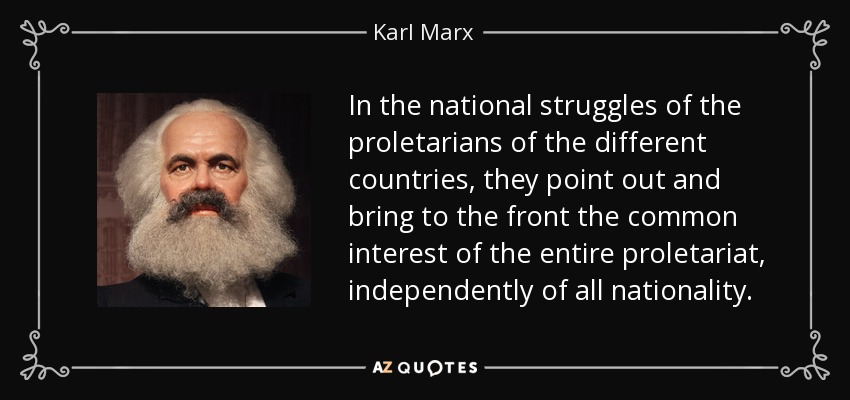Have you ever wondered why some people have so much while others struggle to make ends meet? Why is it that some societies seem to be stuck in poverty while others flourish with technological advancements? These questions, amongst others, have fascinated thinkers for centuries, but one of the most influential attempts to answer them has been through the lens of Karl Marx’s theory of the “means of production.”

Image: www.azquotes.com
This seemingly simple concept – the means of production – is not just an academic exercise. At its core, it challenges us to understand the fundamental relationship between people and their economic realities. It speaks to the power dynamics within society, the ever-evolving nature of work, and the potential for both progress and conflict. This article delves into the world of Karl Marx, exploring his ideas, their implications, and how they continue to inform our understanding of the world around us.
What are the Means of Production?
To understand Marx’s ideas, we need to start with the basics. For him, the “means of production” are the tools, raw materials, and infrastructure required to produce goods and services. Think of it as the raw horsepower of an economy. These “means” can range from the simplest of tools used by a farmer to the complex machinery found in a modern factory. It’s everything that allows us to transform nature into something useful.
But the means of production don’t exist in a vacuum. They are always intertwined with the “forces of production,” which encompass the human skills, knowledge, and abilities necessary to use those tools and resources. It’s the combination of physical capital (means of production) and human capital (forces of production) that drives the engine of economic progress.
The Relationship Between Classes: Ownership and Labor
Marx’s most significant contribution to our understanding of the means of production lies in how it shapes the relationship between different classes within a society. He argued that the ownership of the means of production creates a fundamental division. The “bourgeoisie,” the class that owns the means of production, controls the wealth and resources of society. On the other hand, the “proletariat,” the working class, lacks ownership and is forced to sell their labor to the bourgeoisie in exchange for wages.
Herein lies the core of Marx’s argument: the relationship between these two classes is inherently unequal and exploitative. The bourgeoisie, by owning the means of production, extracts surplus value from the proletariat’s labor. This surplus value, Marx argued, is the profit that the capitalists accumulate, while the workers only receive a portion of the value they create. This exploitation, he believed, would eventually lead to revolutionary change as the proletariat grows increasingly aware of its own power and the inherent unfairness of the system.
Beyond Exploitation: The Dynamics of Change
But Marx’s analysis wasn’t merely a call to revolution. He was keen on understanding the historical and social forces that shape how the means of production evolve. He saw a constant state of flux in the relationship between technology, labor, and class structures.
For example, the Industrial Revolution saw the rise of factories and mass production, replacing individual artisan workshops. This shift in the means of production created a new class of industrial workers, the proletariat, and a new set of power dynamics. As technology continued to progress, Marx predicted that the means of production would continually evolve, with new innovations creating new forms of work and new forms of social conflict.

Image: unicornshirts.net
The Impact of Technology and Automation: A Modern Perspective
Marx’s theories have often been viewed through the lens of the Industrial Revolution, but their relevance extends far beyond. Even today, we can see how the evolution of the means of production continues to reshape our world.
Consider the rise of automation and artificial intelligence (AI). These technologies are rapidly transforming industries, displacing traditional jobs, and raising new questions about the future of work. As machines become increasingly capable, the relationship between labor and capital is evolving once again. This evolution presents both opportunities and challenges, highlighting the ongoing relevance of Marx’s concepts and the need to consider their implications for our modern world.
Karl Marx Means Of Production
The Enduring Relevance of Marx’s Theories
While Marx’s predictions about the inevitable communist revolution haven’t come to pass in the way he envisioned, his ideas continue to resonate today. His work provides a powerful framework for understanding the dynamics of inequality, labor, and economic power.
His analysis of the means of production helps us grapple with pressing contemporary issues like the rise of gig economy, the widening income gap, and the implications of automation. It forces us to question the ownership of technology and resources, the nature of work, and the power dynamics that shape our society.
In an age where technology is rapidly transforming the world around us, understanding Marx’s theories about the means of production is more important than ever. By exploring these concepts, we can better understand the forces that drive our economies, the challenges we face, and the potential for change in a world where the relationship between people and their means of production is constantly evolving.





